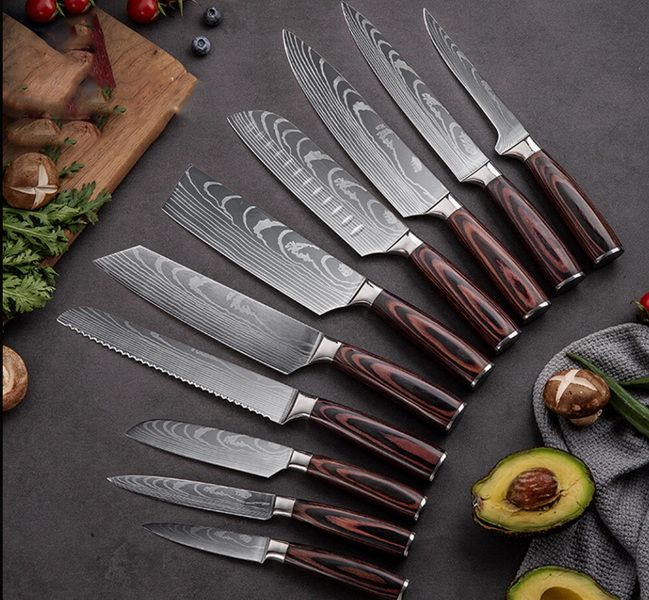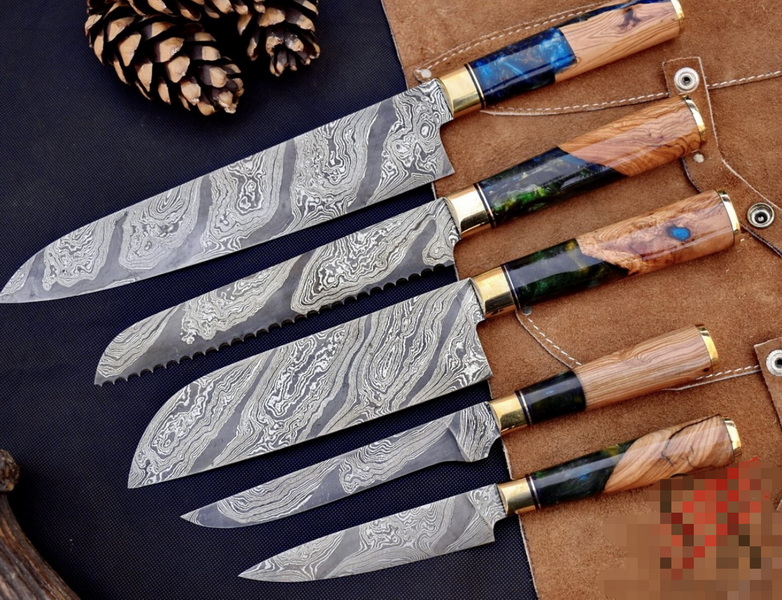- All
- Product Name
- Product Keyword
- Product Model
- Product Summary
- Product Description
- Multi Field Search
Views: 222 Author: Ann Publish Time: 2025-10-14 Origin: Site











Content Menu
● Exceptional Sharpness and Edge Retention
● Rust Resistance and Maintenance
● Aesthetic Appeal: Beauty Meets Function
● Versatility in Kitchen Tasks
● Craftsmanship: The Art of Forging Damascus Knives
● Damascus Knives and Cutting Precision
● Damascus Knives: Balancing Tradition and Innovation
● The Role of Damascus Knives in Professional Kitchens
● How to Care for Damascus Knives
● Comparing Damascus and Conventional Knives
● Why Serious Chefs Invest in Damascus Knives
● Frequently Asked Questions (FAQs)
>> 1. What makes Damascus knives different from regular kitchen knives?
>> 2. Are Damascus knives harder to maintain?
>> 3. Can Damascus knives be used for all kitchen tasks?
>> 4. How long does a Damascus knife last?
>> 5. Why are Damascus knives more expensive than regular knives?
For serious chefs, having the right kitchen knife can make a world of difference in the precision, speed, and quality of their culinary creations. Among the myriad of knives available, the Damascus knife stands out as a prized tool. Renowned for its unique beauty, incredible sharpness, and exceptional durability, a Damascus knife is not just a kitchen utensil, but a chef's trusted companion. This article will explore why Damascus knives are essential for chefs dedicated to their craft and how their unmatched qualities elevate cooking performance.

A Damascus knife is forged using a unique technique called pattern welding, where multiple layers of steel—often a combination of hard and softer metals—are folded and forged together. This process forms a blade with distinct wavy patterns and remarkable properties that single-steel knives cannot match. The layered steel creates one of the sharpest, toughest, and most visually stunning kitchen knives available.
For example, a typical Damascus knife may contain dozens or even hundreds of layers, giving it unmatched strength and flexibility that chefs can rely on for precise cutting.
One of the primary advantages of a Damascus knife is its extraordinary sharpness and edge retention. Thanks to the multiple layers, including a high-carbon steel core, Damascus knives maintain a razor-sharp edge throughout extended use. This means chefs do not have to frequently sharpen their blades, allowing them to maintain precision during intensive meal prep.
The precision in cutting impacts everything from the texture of food to the presentation on the plate. A sharp knife reduces crushing of delicate ingredients like herbs and fish, preserving aroma and freshness.
Damascus knives combine hardness with flexibility, a balance that prevents the blade from chipping or breaking during rigorous kitchen tasks. The layered construction absorbs shocks better than monosteel blades, ensuring the knife withstands daily chopping, slicing, and dicing without losing integrity.
This toughness makes Damascus knives a smart investment for chefs who need reliable tools that last years, even decades, under heavy use in professional kitchens.
The layering process also enhances resistance against corrosion. While not completely rust-proof, Damascus knives generally resist oxidation better than many high-carbon steel knives. Proper care, including regular drying and oiling, extends the lifespan of a Damascus knife and keeps its beautiful pattern gleaming.
Chefs find that maintaining a Damascus knife is less laborious compared to traditional carbon steel blades, which often require more rigorous upkeep.
Beyond functionality, Damascus knives are prized for their striking visual appeal. The flowing, wavy patterns created by the layered steel are unique to each blade, making every knife a piece of functional art. This aesthetic quality adds prestige and personal satisfaction for chefs who value craftsmanship and tradition in their tools.
A Damascus knife often becomes a signature piece in a chef's collection, an heirloom passed down through generations. The beauty of the blade is a testament to the ancient forging techniques revived in modern knife making.
Serious chefs require knives that can perform a variety of tasks – chopping vegetables, slicing meats, mincing herbs, and more. Damascus knives are highly versatile, ideal for multiple kitchen functions due to their sharpness, balance, and edge retention.
Many top chefs prefer Damascus knives as their go-to blade because they handle delicate and tough tasks with equal efficiency, enabling chefs to work quickly and confidently.
Creating a Damascus knife is a highly skilled process, traditionally requiring intricate forging and folding techniques. Some blades involve folding the steel hundreds of times to create the signature layered effect.

Precision is paramount in professional kitchens, where every cut impacts the cooking process and final presentation. Damascus knives offer unparalleled precision due to their sharpness and finely honed edges.
Chefs can execute smooth, thin slices of meat or delicate vegetables without crushing or tearing ingredients. This ability preserves the quality and texture of food, which is particularly essential for high-end culinary creations such as sashimi, fine garnishes, and pastries.
While Damascus steel knives are grounded in centuries-old forging traditions, modern production techniques have enhanced their performance consistency. Manufacturers integrate advanced metallurgy with traditional methods, resulting in knives that balance historic craftsmanship with modern durability.
This blend attracts chefs who respect heritage but demand reliable, high-performance tools. Many appreciate the story and cultural significance behind Damascus knives, which adds meaning to their daily cooking tools beyond mere utility.
In professional kitchens, every tool must deliver exceptional results under constant use and pressure. Damascus knives' combination of resilience, sharpness, and beauty makes them top choices for chefs seeking reliable performance and elegance.
Their ability to perform seamlessly in fast-paced environments ensures that chefs can maintain speed without sacrificing safety or precision. The knives' ergonomic designs, often paired with balanced handles, further reduce hand fatigue during long service hours.
To maintain a Damascus knife's peak performance and stunning appearance, proper care is essential. Here are some key tips:
- Hand wash the knife promptly after use with mild soap and dry immediately to prevent moisture damage.
- Avoid dishwasher use, which can cause rust and damage.
- Regularly oil the blade with food-safe mineral oil to protect against oxidation.
- Store the knife safely in a block or sheath to protect the edge.
- Use a honing rod or professional sharpening services when necessary to keep the edge razor-sharp.
Following these care steps will ensure a Damascus knife remains a reliable kitchen companion for many years.
| Feature | Damascus Knife | Conventional Knife |
|---|---|---|
| Sharpness | Superior, long-lasting sharp edge | Generally dulls faster, needs frequent sharpening |
| Durability | High toughness with flexibility | May chip or break under heavy use |
| Rust Resistance | Better resistance due to layered steel | Varies, often less resistant |
| Aesthetics | Unique wavy pattern, artistic | Plain or uniform |
| Maintenance | Moderate (regular care needed) | Varies by steel type |
| Versatility | Excellent for various kitchen tasks | Depends on knife quality |
This comparison shows why Damascus knives excel in professional kitchens, offering a blend of beauty, reliability, and high performance.
Serious chefs prioritize tools that enhance their efficiency and precision. Damascus knives offer a competitive edge by combining aesthetics with practical features that elevate the cooking experience. The sharpness, durability, and light balance of Damascus knives reduce fatigue and improve the quality of cutting, translating to better food preparation and presentation.
Investing in a Damascus knife is investing in a lifetime companion that grows with the chef's expertise.
Damascus knives are a must-have for serious chefs due to their superior sharpness, exceptional durability, elegant design, and versatile functionality. Their unique layered construction provides excellent edge retention and toughness that help chefs perform consistently in fast-paced, demanding kitchens. With proper care, a Damascus knife can last a lifetime, becoming more than just a kitchen tool, but a valued part of a chef's culinary journey. Whether for professional use or passionate home cooking, Damascus knives offer unmatched performance and beauty that justify their status as essential kitchen knives.

Damascus knives are made by layering different steels and forging them together, creating a blade with superior sharpness, durability, and unique wavy patterns that ordinary knives lack.
No, while they need regular care like any high-quality knife, Damascus knives generally resist rust better and hold their edge longer, reducing frequent sharpening.
Yes, they are versatile and suitable for chopping, slicing, dicing, and mincing, making them ideal for various kitchen functions.
With proper care, a Damascus knife can last decades, sometimes becoming heirloom pieces passed through generations due to their durability and timeless design.
The cost reflects the complex forging process, craftsmanship, quality of materials, and the knife's superior performance and aesthetic value.
The Ultimate Professional Knives for Halal Butchery in Middle Eastern Kitchens
Chef Knife Size Guide: Choosing Between 6″, 8″, 10″, And 12″
Custom Knife Handles: How To Design A Chef Knife That Fits Your Hand Perfectly
Chef Knife Surface Treatments Guide: From Polished Migaki To Damascus Patterns
Inside Our Professional Knife Sample Room: Quality You Can See
Universal Knife Block Buying Guide: Modern Acrylic & ABS Knife Holders for Professional Kitchens
Universal Knife Block: The Complete Guide To Modern, Hygienic Knife Storage
The Complete Guide To Red Handle Knife Sets: Style Meets Functionality in The Kitchen
Professional Knives for Halal Butchery And Middle Eastern Cuisine